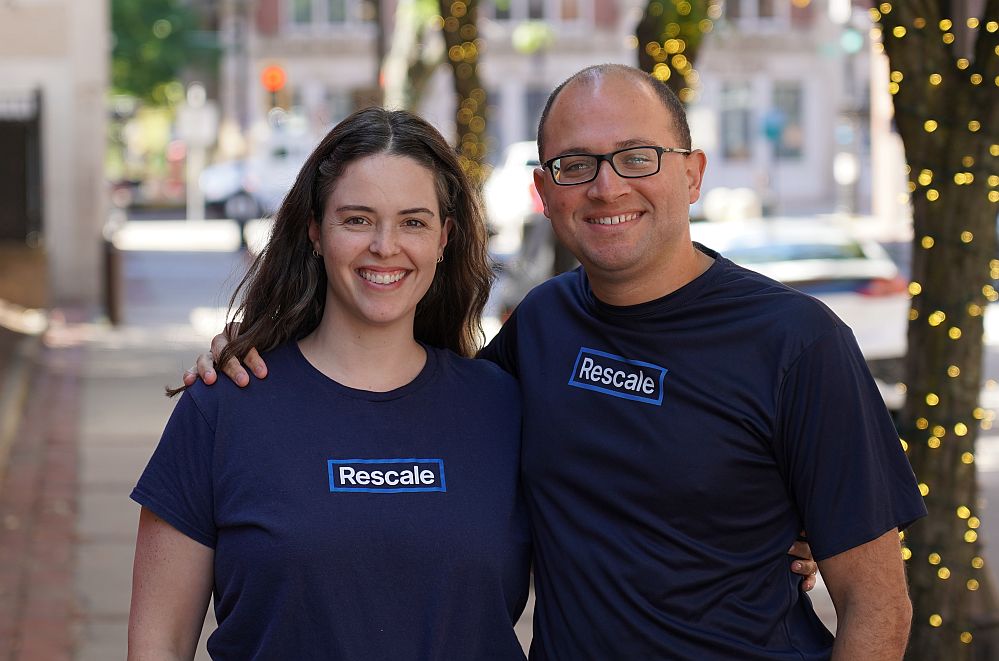ReScale—a Boston-based startup led by ex-Trader Joe’s exec Julia Megson—has emerged from stealth after raising a $2.3 million round led by Baukunst to address a major pain point for small and medium sized CPG brands: sourcing, negotiating, and managing external manufacturing partnerships.
The funding round, supported by Dartmouth Angels and various CPG industry angel investors, will help Megson (CEO) and cofounder Matthew Kaliara (CTO) further build out an online platform to help brands with under $100 million in revenue find a co-manufacturer “who can actually make your product,” Megson told AgFunderNews.
“But we also recognize that this is just the beginning. Brands then need help with contracting and then managing that relationship,” added Megson, who spent just under four years working in supply chain management at Trader Joe’s, working on everything from warehousing and logistics to auditing contract manufacturing partners.
“Finding a contract manufacturer is still mostly done by word of mouth,” said Megson, who spent three years at online marketplace FARMIGO before moving to Trader Joe’s. “About half of small- and mid-size food brands rely on white label manufacturers, but for each new item, they have to start from scratch. We spoke to hundreds of brands that all said it’s their biggest problem. It’s a mess.”
ReScale’s dashboard is designed to help brands bring new products to market more quickly by streamlining manufacturer matching, contracting, and management, added Megson, who says early customers at ReScale include a restaurant chain that sells products in Target nationwide and a VC-backed hot sauce brand selling in 2,000+ retail locations.
“For rapidly growing food brands, scaling manufacturing and production is an opaque, complex, and time-intensive process. Rescale solves these problems. The team’s deep expertise in food manufacturing and grocery qualifies them to build trust and transparency within this ecosystem, helping customers quickly find the perfect co-manufacturer.” Matt Thoms, general partner, Baukunst
A word of mouth process in urgent need of an overhaul
Trader Joe’s is “one of the most prestigious, largest private label purchasers” out there, noted Megson. “But they use the same methods as everyone else [to identify potential partners]. Food and beverage manufacturing is really offline, so brands large and small still rely on trade shows and networking.”
She added: “After I left Trader Joe’s, I was a consultant for emerging CPG brands, which was a very interesting experience to be on the other side, where you’re not this heavy hitter but you’re having to really make your case [to the copacker]. And that’s really where the idea for ReScale was born.”
If you attempt to find potential manufacturing partners via a Google search, she said, “The information is just not indexed. Half the time, brands that do their own manufacturing but also do white label will not list co-manufacturing anywhere on their websites. So what tends to happen is that people will pay a consultant to run a search process, which is quite expensive, plus consultants are themselves limited to their own Rolodex.”
TurboTax for co-manufacturer onboarding
ReScale—which launched in beta testing mode last fall with 12 customers—will make its official debut in the coming weeks, and has three components, said Megson.
“The first one is search, building a list of all the possible co-manufacturers for emerging CPG brands that haven’t done this before, so we’ve got a list of about 9,000 at this point.
“Then there’s TurboTax-type tools to help brands navigate co-manufacturer onboarding. So much like the average person doesn’t speak the CPA language and doesn’t know all the rules and tax documents to look for, we’re giving brands those kind of guardrails to go through the onboarding process as an expert.”
The third component is a “high touch customer support team of people who’ve done this before so we can be a lower cost way to access expertise for when you need it in your process, rather than having a $60,000 expert on retainer for the duration of the search,” she said.
Asked how ReScale identifies and validates co-manufacturers, Megson said: “We’ve scraped a lot online and we’ve embedded some AI into our search, we’re working with some call teams, plus there’s an element of self-service, where manufacturers can update their profiles on our site, but we’re still working on the best method to get a more robust in-depth profile for each of them.”
Brands can search by various criteria including product, geography, and certifications, said Megson, who says ReScale makes money by charging SaaS monthly subscriptions to brands looking to find contract manufacturers.
“Search is the beginning, but there are a lot of other products that will make sense to build in the future, for example, inventory management or finding the right trucking or warehousing partner.”
‘Predatory situations’
According to Megson: “Once your search identifies a shortlist of manufacturers, you would have an NDA (non-disclosure agreement) and an RFP (request for proposal) sent out to all of those manufacturers. We have tools that automate the signature and release of those documents, and then the manufacturers can submit bids on those RFPs.”
At this point, she said, users can “seek advice and feedback on the bids from our team of advisors, and manage document exchange such as food safety certifications, contract drafts, getting into trials together… it becomes much more like dating once you get into that post-RFP stage.”
The key point is that ReScale’s service “doesn’t end at the list, as there’s so much that can go wrong after that,” said Megson, who said emerging brands often end up in “predatory situations,” get locked into exclusives, or make unwise commitments to meet volume thresholds based on overly optimistic sales projections.
“We’re currently working on building out a roster of different service providers [such as attorneys that can help develop contracts],” she said. “We have tools to help users save on legal costs for things like NDAs, but we’ll also offer introductions to people who specialize in these exact areas.”





